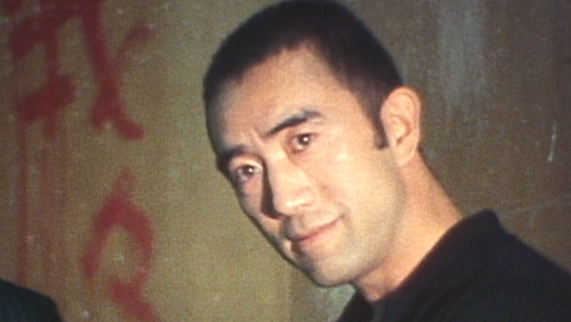
Japan, November 25, 1970. The esteemed, popular and controversial writer-playwright-poet Yukio Mishima, who had established a private army three years earlier, plots to cause a revolution and take over the Japanese army. Mishima, an extreme right-wing nationalist, believed that the militia he founded – the Defense Association, was the only one worthy of defending the emperor. He and four of his men entered a base of the Japanese army in central Tokyo – the headquarters of the Eastern Command, on the pretext that they had come to visit the commander. The group managed to enter, tied the commander to a chair, took him hostage and fortified himself. Equipped with a ready-made manifesto and posters detailing his demands, Mishima went out on the balcony and addressed the Japanese army soldiers, who had gathered downstairs. Despite his attempts to persuade the soldiers to join him, he only managed to annoy them.
Mishima: The Last Confrontation – Trailer
The coup attempt failed and Mishima, 45, decided to end his life in a ritual called Spoku (Harikiri) – a ceremonial suicide of cutting a belly using a dagger, taken from the world of the values of the samurai who preferred to end their lives rather than be defeated by the enemy and fall into his hands. Mishima decided to die by beheading, and his assistant (some would say his lover) was called to the mission, but he had difficulty decapitating his revered commander. After three attempts, another member of the militia beheaded Mishima. The event was broadcast on Japanese television and left the nation of the land of the rising sun in astonishment. “Even the pictures of the familiar head in the newspapers were published. The people who saw these photos in the newspapers and watched the dramatic coverage of the dramatic event on television were shocked to the core. A shock wave hit Japan,” said Kisuka Toyoshima, director of the documentary Mishima: The Last Conflict, in an interview with Zoom. Held on the occasion of the screening of the film at the Jerusalem Cinematheque’s online festival, “Aki-Nu: Japanese Film Festival.”
“I think Mishima eventually wanted to get to the emperor’s palace. Because he failed he decided to confront the army. The authorities did not expect anything like this to happen, because Mishima’s army was not a large or important enough organization. Moreover, Mishima constantly threatened to commit suicide and therefore did not. “It was taken seriously. Mishima’s choice to commit suicide in Spoku, which was officially banned in 1868, left a huge impression on the entire country. In light of this, Mishima’s name in Japan has become synonymous with death.”
4 View the gallery
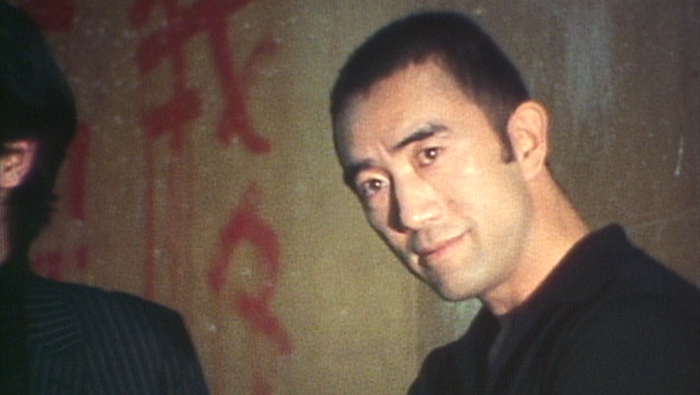

Mishima: The Last Conflict
(Photo: GAGA CORPORATION )
In 1969, a year and a half before that national trauma, Mishima, who had been nominated three times for the Nobel Prize, came to the Tokyo University campus to take part in an intellectual confrontation with a thousand left-wing and liberal students who opposed his views. Just as student demonstrations and protest movements took place around the world in the late Sixties, so too did Japan experience a wave of student strikes and riots demanding an end to the war in Vietnam. The students even demanded a change in the higher education system. “After Japan lost World War II and the United States took over, it also changed the country’s constitution. Mishima could not contain it and wanted to persuade in his words the Japanese people to change the constitution back so that it would serve the good of the people. Mishima is also afraid of the rise of communism in Japan, so he set up his own army to fight rising communism. ”
Toishima says that in the confrontation everything was open – both sides, right and left, exchanged views, in a respectful manner. Mishima also enjoys stinging the students. “The confrontation could have ended in violence, if only the participants had wanted it – but it did not happen. All the participants spoke with the utmost calmness, endless rationality, and Mishima carefully clarified his words. See he wanted more than anything the other side would understand and identify. “To express his opinion but also to communicate with the other side, so that they will understand where he came from and why he thinks that way.”
The conflict that has become mythological has been documented and parts of it have even reached YouTube in recent years, but most of the material was considered lost. “The facilitator of the confrontation was a member of the Tokyo University Student Union, and he had contacts with one of the journalists from the Tokyo Broadcasting Station (TBS). So he informed the journalist Tatsuhiro Tuna about the confrontation and it came with a 16mm camera and managed to film the whole event,” he says. Toyoshima. “The next day only the sensational material was televised, for example the moment Mishima talks about how much he admires the Japanese emperor. His remarks were seen as an incitement speech aimed at students. He also hinted that he would end his life soon. Over the years, people have forgotten that documentation of the confrontation exists in the film. I was actually aware of the existence of the lost film. In 2019 the lost materials were found. “The journalist Tetsuhiro was able to find the materials and since we knew each other and we were friends, he called me and invited me to direct a documentary, which will be based on his filming.”
4 View the gallery
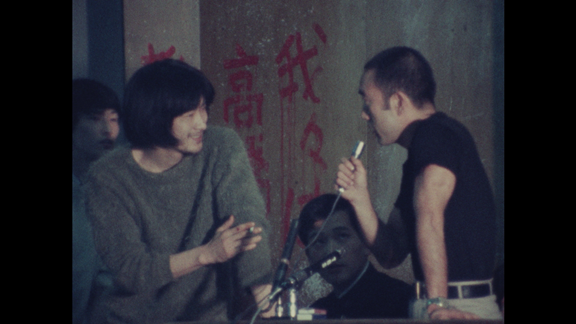

The famous confrontation. Mishima on the right
(Photo: GAGA CORPORATION )
Toyoshima, who was born a year after Mishima’s death and specialized in a variety of genres, including comedies and horror thrillers, found himself diving into the fascinating and tangled world of the man of contrasts and also went out to meet the heroes of the confrontation. “In schools in Japan, Mishima’s books are taught, but his life and death are not taught because it is not considered a relevant subject for education.” Evidence of Toyoshima. “Mishima’s life is also perceived as too sensational to learn about. So we wanted to pass on the shock Japan experienced from Mishima’s spooky to the younger generations, who were born after his death.”
What is the most surprising thing you discovered during the making of the film that made you change your attitude towards the task?
“The impression I had on Mishima over the years was the usual impression: a creator who wanted attention and recognition, a right-wing intellectual who set up an army and also starred in several films. But after seeing the confrontation I came to see another Mishima – a funny and happy person. I was pleasantly surprised. I interviewed 13 interviewees. And half of them were in the confrontation itself and heard Mishima’s speech. The rest knew Mishima personally, and in addition there were scholars who delved into his character. After a conversation with everyone I discovered different aspects of his personality, and I was surprised how many layers he had. It intrigued and fascinated me and wanted to show viewers humor and joy. His life”.
Why do you think Mishima has become an icon in Japan and a figure that fascinates many people to this day?
“Quite a few people read his books and poetry and appreciated his work. Beyond that, Mishima also dabbled in bodybuilding and posed for various magazines – he even appeared almost naked in the Japanese equivalent of Playboy magazine. So Mishima had many young fans, though the older generation. Did not view his activity favorably. How are writers usually perceived? Immersed between the pages, perhaps boring, square people. Mishima, on the other hand, was different, unusual and unique. He was not afraid to say what was on his mind. He was talented and became a star. No. Hib is a writer like him throughout Japanese history, a man with so many abilities who managed to break the stereotype of writers. “
4 View the gallery
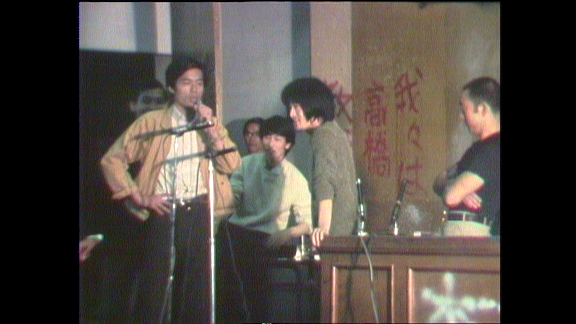

From “Mishima: The Last Conflict”
(Photo: GAGA CORPORATION )
Mishima was born under the name Kimitka Hirouka in 1925. He was a weak female woman, while his father was a tough military man, hating a man and persecuting women. In his infancy, Mishima was taken from his mother by his mentally disturbed grandmother. The grandmother raised him in a dark room and did not allow him to play or do sports. She also decided to raise him as a child. At the age of 12 he returned to his parents’ house and began writing, despite his father’s opposition. At the age of 15 he joined the editorial staff of a reputed literary newspaper. Mishima also tried to shed the femininity that his grandmother forced on him and began to develop his body and spend time with boys. In 1948 he published his first novel, the autobiographical “Confession of a Mask”, when he was only 23 years old. The book was recently translated into Hebrew and Mishima is actually coming out of the closet. One can find in it a cannibalistic erotic fantasy and descriptions of bdsm scenes.
In conservative and homophobic, repressive and non-external Japan, Mishima dared to apply his homosexual desires, but was forced to wear a mask – he obeyed the tradition, got married and had two children. “Mishima as mentioned used to do buddy-building and nurtured his body and researched the beauty of the body and it was also important to him that the uniform of his private army be beautiful – nowadays, such an approach is linked in our eyes to homosexuality, but that does not necessarily mean that Mishima was gay in reality,” says Toyoshima. . “Mishima may have experienced a homosexual relationship in order to write his stories – he wanted to experience the experience and experience the world he wrote about. To me, the issue of Mishima’s sexual identity is not unequivocal. He was a complex person with many sides to his personality.”
Do you think there is a connection between his experiences and the samurai tradition, according to which an older samurai could have slept with the samurai younger than him – sexual initiation that was considered normative?
“Possibly. Mishima was very impressed by the story of Miyamoto Musashi, a 17th-century fencer who wrote the ‘Five Rings Book’ which deals with martial arts and philosophy, and to this day influences, so it’s possible. That’s not my specialty, so I do not know for sure.”
4 View the gallery
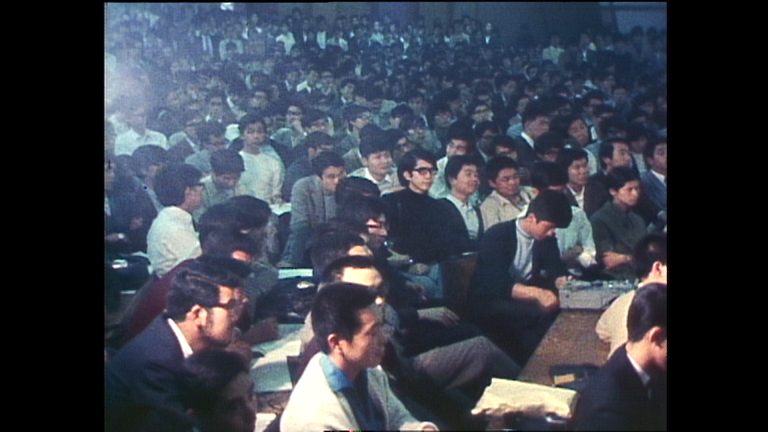

From “Mishima: The Last Conflict”
(Photo: GAGA CORPORATION )
How were the reactions to “Mishima: The Last Conflict”?
“The premiere was attended by people who were members of the Tetanukai army on the one hand and representatives of the Tokyo University Student Organization who were in conflict on the other. I was afraid a quarrel would break out, but in the end the screening passed peacefully and everyone remained calm. After watching, the viewers left the film feeling good. “Tatnokai were happy because they felt like they had met Mishima one last time. On the other hand, the members of the student body remembered the ideals they once held – the desire to change the world. So it turned out that everyone came out excited, while I felt we had achieved our goal.”
Can you imagine Mishima living today in the age of social media?
Toyoshima bursts out laughing. “The administration of Shinzo Abe, who was prime minister of Japan for seven years until last September, lied about right and left and lost the trust of the people. So therefore, the difference between Mishima’s sincerity and Abe’s lies was probably very upsetting to him. Also, confrontations This is something that is common in modern-day Japan, but it takes place mostly via Twitter and is limited to 140 words. Usually the content of these ‘confrontations’ remains low and includes cursing and shouting. Of course everything is usually done anonymously. No one says:’ My name is So, and my opinion is … ‘, so if Mishima were alive today he would not use Twitter. He might have opened his own forum on the net, on which his name would proudly hang and Mishima would invite everyone to speak there openly and also would not take on It’s money. ”
And what would Mishima think of Japan and today’s world?
“First of all he would feel that everyone underestimated the importance of the written word – for him it was very important to choose the words carefully and carefully. I think he was very angry about this contempt. Also, Mishima saw himself as the main character in his life story, which he ended as stated. In suicide. It was the end he wrote. There are rumors that he feared old age, weakness, suffering, possible loss of control over his beautiful body so he chose to die young. If he had reached old age he might have actually lived quietly and lowered his profile, so as not to expose himself In his weakness. “

